- Home
- William Kowalski
Eddie's Bastard Page 7
Eddie's Bastard Read online
Page 7
The winter of 1977 was a particularly bad one. Late that fall, before winter had even officially begun, there came a storm that encased everything in a solid inch of ice. The world as I knew it was once again transformed, this time into something beautiful. Trees, shrubs, power lines, the ancient brick oven next to the old carriage house, even the old farmhouse itself—everything was sealed in solid glass, arrested in the endless path of birth and decay and held still like a preserved animal to be examined. The Dreaded Scarum, whose presence still remained known only to myself, receded, as though this inexplicable phenomenon of nature merited a temporary truce. The sun, small and white and cold, glinted on everything with magnified vigor. The backyard became an acre of mirrors, upon which I could slide with incredible velocity.
With the retreat of the Scarum, I rediscovered my love of dangerous and stupid stunts. The sudden absence of friction from the world created new and fascinating possibilities. This was not the same sort of ice that formed on the surface of the Lake. That ice was rough and uneven, sometimes buckling into huge white mountains, the tombs of waves, it seemed, that had been caught and held there. That ice was also unpredictable. It looked solid enough, but it was precisely that illusion of solidity that had led Grandpa’s own father to his death in 1912 when he tried to drive across it to Canada. This ice was smooth and pure, scoured unceasingly by the winds of the storm into absolute flawlessness, with not a smudge or a crack in it. By propping open the kitchen door and running from the far wall, I could get up enough speed to launch myself onto the ice and skim gracefully on my belly almost a hundred feet across the yard. It was like flying. The first time I did it I smacked my face and split my lower lip open, but I’d done that so many times already in my life it hardly seemed worth crying about. I flew again and again and again, until I was exhausted but too hysterical with delight to stop. Finally I decided that I would make one last run and then find Grandpa so he could fix me some lunch.
I hadn’t seen Grandpa all morning, but that was nothing unusual. Sometimes several hours would pass without us encountering each other in the huge old house. When one of us needed to see the other on some matter of importance, we rang the old iron dinner triangle that hung outside the kitchen door. After my last slide I would ring for Grandpa, who would appear and say, “Fried baloney all right?” It was what he always said. It was what we always ate, and it was always all right.
I never completed my last slide. Instead I ran smack into Grandpa, who was coming up the back stairs to ring the triangle himself. He’d been wondering where I was, and was coming to ask me if fried baloney would, once again, be all right.
We collided just as I parted company with the last inch of runway. I heard the air go out of him in a soft, surprised “Hooo!” as my head drove into his elderly abdomen. He was propelled backward as though shot point-blank with a howitzer. We landed together, me on top of him, safely cushioned by his comfortable stomach. He, however, had nothing to cushion him except an inch of ice. I heard and felt a mighty crack somewhere deep inside his body, and he gave such an anguished and horrified scream that I knew the Scarum hadn’t been gone after all; he’d only been lurking, waiting for my defenses to drop in the false lull of terror.
“Oh, shit,” I said. That was my new word that year.
“My hip,” said Grandpa.
“I’m sorry!”
“Get off me.”
“I’m sorry I’m sorry I’m sorry…” I said, meaning it more than I had ever meant anything. I crawled off Grandpa’s poor broken body. He screamed again. I put my hands over my ears and shut my eyes. I felt the Scarum licking at the back of my neck, his hot breath foul and damp.
“Billy,” said Grandpa, “stay calm.” His face was white and he breathed in high-pitched gasps. “You have to call somebody for help.”
That, at least, was something I knew how to handle. I slithered my way over the slicked-up stairs into the kitchen, the Scarum panting hard at my heels. I knew that if I turned around at that moment I would see him. I chose not to look.
The phone was cold and black and very heavy. I held the receiver to my ear and listened. It was, of course, dead. So was every other phone in New York State. The ice storm had temporarily neutralized all the effects of modern civilization upon the world. It might have been 1877 instead of 1977. It might have been the dawn of time.
“Hello,” I said calmly, hoping against reason that someone was listening anyway. I refused to let the desperation I was feeling drag me down into the abysmal blackness that was opening at my feet. “Hello!” I shouted again. I was crying now, which made me angry; I hated crying. I slammed down the phone and ran to the door.
“It doesn’t work!” I screamed. Later I would discover that the phone hadn’t been working for three weeks, but since neither Grandpa nor I knew anyone to call and since there was nobody to call us, there was no reason to discover that fact until an emergency arose, by which time, of course, it would be too late.
“Oh, fuck a duck,” said Grandpa, sounding more like his old self. That calmed me. “Okay, Billy,” he said, “listen to me carefully. You’ll have to take the Galaxie and get some help.”
“The Galaxie!” I began to cry again. “No way! I don’t know how!”
“Listen to me,” said Grandpa. His face was growing whiter. “Listen to me. I can’t move. It’s very cold out here, and I’m going into shock. Do you know what shock is? It’s when you’re hurt very badly, and your body temperature drops. I could freeze to death, Billy,” he said. “If I don’t get some help soon, I could die.”
For some inexplicable and perhaps divine reason, as soon as Grandpa said that, my fear was gone completely. Even though I was only seven years old, I assumed the burden of Grandpa’s life with the confidence of a man who’d lived my life span many times over.
From the diary:
Fear is a great obstacle to many things, but once it is removed, one can see clearly what needs to be done.
I ran back into the house, found some blankets, and arranged them on top of Grandpa. Not even he had thought of that.
“Good boy,” he said approvingly. He was in intense pain, breathing rapidly.
A sudden flash of inspiration hit me. It was almost palpable, as if it had been planted in my head by someone or something, some force that was watching out for me. “I’m taking the rider mower,” I said. Even in agony, Grandpa was impressed.
“Beautiful,” he whispered. “I’ve raised a genius.”
The mower was kept in the carriage house. At some point in recent history the old solid oak door, which opened horizontally, had been replaced with a modern metal garage door, one that opened vertically; this, like everything else, had been iced over. Had it been fully shut, it would have been impossible for me to move. Mercifully, however, it had been left open enough for me to crawl under it. Once my eyes adjusted to the gloom, I located the mower and sat astride it. It was hard to see in there, but I had driven the mower so many times before, I could have started it in total darkness. I pulled out the choke, retracted the blade—even though it was long gone—moved the throttle down to the picture of the turtle, which meant slow engine speed, and turned the key. The motor caught on the third try. I let it warm up for a few moments, gradually inching the throttle up to the picture of the rabbit, until it sounded ready. Then I stepped on the clutch and slowly shifted into first gear. The clutch slipped out from under my slick booted foot, and the mower and I hurtled forward into the mostly closed garage door, which was exactly what was needed to shatter the ice on it so that I could open it the rest of the way. I hadn’t intended to do that, of course, but at age seven I was very superstitious, and this seemed to be a sign that things were eventually going to be okay, that someone really was watching out for me. I was reassured.
Cautiously I piloted the mower down the frozen driveway, still in first gear. I dared only one look over my shoulder at Grandpa. He was lying where I’d left him, his legs sticking stiffly out before him and his a
rms spread out to the side, looking oddly like a very large child in the act of making a snow angel. I wanted to wave, but I didn’t dare take my hands off the steering wheel. I faced forward again and put the mower into second gear.
There was only one place I could go for help, and that was the Simpson house. In ordinary circumstances I would rather have cut off my arm than appear suddenly at their front door. For all I knew, Mr. Simpson would kill me on the spot and eat me for dinner. These, however, were not ordinary circumstances. Grandpa’s phrase I could die rang in my ears with the urgency of an ambulance siren. It was dangerous to go above second gear, so I did my best to maintain a constant speed. When I got to the junction of our dirt road with the paved county road, I peered hopefully to the east and west, looking for a car, or a policeman, or an airplane, or anything. There was not a living creature in sight. The entire coast of Lake Erie had been immobilized. It seemed to me that the entire planet had been dunked in liquid mirrors, and only I, a seven-year-old boy, had survived the immersion to crawl about on its surface, a tiny and unnoticeable being living alone on a cosmic paperweight.
The mower skidded only slightly on the road. It was far lighter than a car, so even when I did skid there wasn’t enough momentum to carry me into the ditch. The wheels spun maddeningly, however, and when I got to the base of the hill on top of which sat the Simpson house, they lost their grip entirely. The rider couldn’t do it. I sat dejected, the motor humming incongruously under me in an otherwise silent world. It would take me forever to climb up the hill on foot. It was just too slippery. I could see the Simpson house far above me, glimmering and glinting in the sunlight like a tantalizing beacon of hope. I thought of Grandpa, slowly freezing to death in the yard. I almost began to cry again. I wouldn’t let it out, however—I must be brave, like my father, I thought. My father never cried. Certainly not in situations like this anyway. He would have flexed his bronzed arms, grinned his bewitching grin, spit contemptuously on the ground, and gone straight to it. I would have liked to go straight to it too, but I had no idea what it was I needed to do.
And then I hit upon the solution that would later be reported in the Mannville Megaphone as the heroic feat of the century, a stunning example of youthful ingenuity under duress. I turned the rider around and went up the hill backward. I wish I could remember how I hit on that idea. It was a true flash of genius, for with the rider reversed, the greater part of the weight was forward; this, combined with the fact that reverse is usually the strongest gear of any machine, allowed me to arrive safely at the top of the hill, rear end first, having traveled exactly half a mile in about thirty minutes.
I maneuvered the rider through the maze of junked cars in the front yard and stopped before the sagging porch of the ramshackle house. There, standing in the doorway, was the girl I had seen playing in the yard several times before. She stared at me in astonishment, one finger in her mouth, her pigtails ratty and frizzed. I hopped off the mower and skated to the door in my boots.
“You better go get the man with the mustache,” I said. “The mean one. My Grandpa fell down.”
She kept staring at me.
“I know who you are,” I said. “You’re the only pretty one in the whole family.”
I still had a lot to learn about how to speak to people I didn’t know; one effect of my childhood solitude has been that I tend to get straight to the point, without observing social niceties, even now as an adult. Sometimes this is good and sometimes it’s not, but in this case it was exactly the right thing to say. Annie told me much later, when we were teenagers, “I had no idea who in the world you were, but I fell in love with you on the spot.”
“You’re hurt,” she said, pointing to my split lip. I’d forgotten about that.
“Annie!” came the voice—that deep, rumbling bass that always set the children crying and made me scurry off down the hill back to the farmhouse. “Who the hell is it?”
Annie didn’t answer. Her eyes changed somehow—clouded over—and she stepped back from the door. In a moment I heard heavy footsteps and the man with the mustache and large belly appeared. He squinted at me through beady piglike eyes. He was much older than I’d previously thought. His hair was thinning and streaked with gray, and his face was like a streambed in summertime, with tiny cracks and wrinkles running all over it. He looked about as old as Grandpa.
“What the hell are you doing here on a day like this?” the man said. “Who are you?”
“I’m Billy Mann,” I said. “My Grandpa had an accident.” It was my fault, I did not add. I began to feel like crying again, but I wasn’t going to do it in front of this man. Something told me I would get no comforting words or hugs from him. Suddenly I missed Grandpa very much. “He slipped on the ice and he says his hip is broken.”
“Billy Mann,” he repeated, his thin lips barely visible under his mustache. “Ooohhh. Eddie’s bastard.”
I wondered if he had read the note left by my mother. How else would he know my real name? He looked me up and down, appraising me like a piece of livestock, as if trying to determine how much of my father’s legendary greatness had been diluted by the genes of my unknown mother. Then he opened the door.
“Come on in,” he said gruffly.
I stepped inside. Every house has its own peculiar odor, but the smell here was almost overwhelming. It was composed of beer and stale cigarette smoke and old greasy cooking and just plain filth, and somewhere deep underneath it all was a layer of fear. I recognized this last smell immediately. It was the smell of the Scarum. I stayed by the door to catch the fresh cold breeze that wafted in.
“Close the damn door,” said the man to Annie, and she did so immediately.
The man waddled into the living room and sat down on the couch. The inside of the house much resembled the outside, except for the ice. There were beer cans and paper plates and newspapers and car parts strewn about the floor, and the couch the man sat on was riddled with holes through which I could see springs lurking like long, ravenous worms. On a low coffee table sat a fascinating apparatus. It had knobs and dials and glass tubes in the back, and a microphone. Mr. Simpson lowered himself onto the couch with tremendous effort and flicked a switch. The tubes in the back of this thing began to glow orange. I wondered if this was the object that produced the flashing blue lights I was always seeing through the windows.
I remained in the doorway next to Annie. I could feel her looking at me but I hesitated to look back. I watched Mr. Simpson instead. When the tubes were a bright orange, he picked up the microphone and, to my astonishment, began speaking into it.
He used a strange language, one I’d never heard before. My heart chilled for a moment; the only other language I’d heard besides English was the one spoken by the foreign soldiers in my dream as they chased me through the forest. But I relaxed when I realized this one was different. The words were made up of recognizable parts: he said “niner” instead of nine and used numbers like “ten-four.”
Annie took me by the hand suddenly. I jumped when she did it; her hand was like a live thing unto itself, soft and vibrant and pulsing. I didn’t let go. Neither did she.
“C’mere,” she whispered, bringing her lips close to my ear. “I want to show you something.”
With another glance at Mr. Simpson, who ignored us as he chattered into the microphone, we crept down a hallway past a filthy kitchen to one of the back bedrooms. The door was open. A stronger smell seemed to issue from here. It was unfamiliar and very unpleasant; I could tell it was the source of much of the odor of the house.
“Look inside,” said Annie.
I did. There on the bed was a man, or a half-man, under a sheet. He lay perfectly still, motionless because he had nothing to move. He had no arms or legs, at least none that I could see under the sheet, and his head was perfectly still. I couldn’t tell if his eyes were open or shut. If they were open, he was simply looking up at the ceiling. The sheet he was covered with was dirty and gray and showed signs of having
been repeatedly soiled without being washed in between. Tubes ran into his body; they hung from clear plastic bags, several of them.
“What is he?” I whispered to Annie.
“He’s my brother. Don’t worry. He can’t hear us. He can’t hear anything.”
“How do you know?”
“Because. He can’t hear or see or talk or anything.”
“What happened to him?”
“He was in a war and he got blown up,” said Annie.
“What war?”
“Vietnam.”
“Vietnam,” I breathed, the familiar word oddly comforting in this sick and alien atmosphere. “I know all about Vietnam. My dad was in it.”
“Come on,” said Annie, taking me by the hand again. “He’s almost done.”
We went back out into the living room. The sight of the half-man unmoving in the bed had shaken me and I was breathing hard. I had a feeling I’d never known before, a different kind of dread than what the Scarum produced in me. How could there possibly be such a person as that man in the back room? I wondered. How could someone be so badly hurt and still live? When I thought of my father dying in his jet fighter I shuddered. If someone could have their arms and legs blown off and still survive, how badly was my dad hurt for him to die? The image was horrifying. I was fighting off the urge to cry again. Annie’s hand in mine was soft and hot and I squeezed it hard.

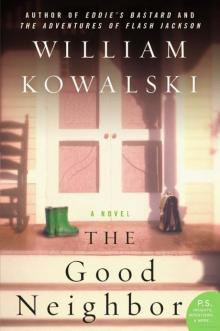 The Good Neighbor
The Good Neighbor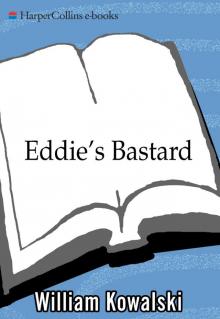 Eddie's Bastard
Eddie's Bastard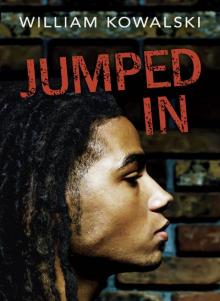 Jumped In
Jumped In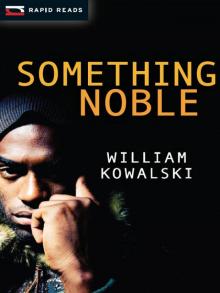 Something Noble
Something Noble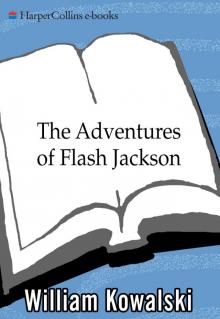 The Adventures of Flash Jackson
The Adventures of Flash Jackson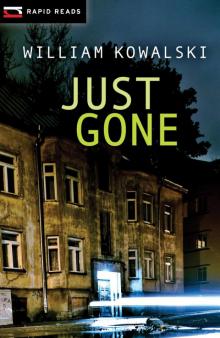 Just Gone
Just Gone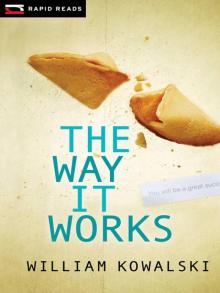 The Way It Works
The Way It Works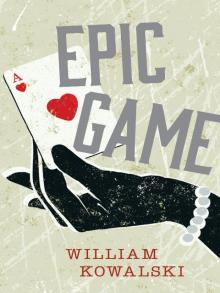 Epic Game
Epic Game